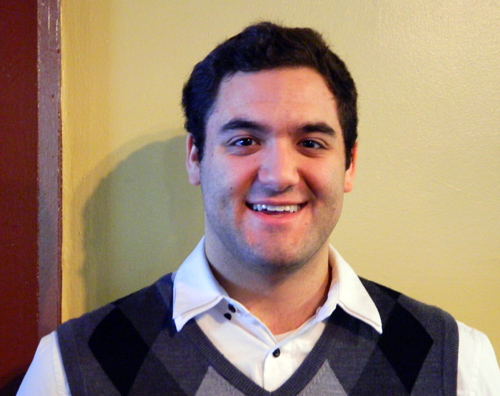
The Gay Pride parade in Toronto has often been seen as controversial, but in 2010 it was hit by an unusual controversy when the group Queers Against Israeli Apartheid wanted to march in the parade with a banner. Others in the city, including some parade sponsors, argued against allowing the group to participate. The parade committee went back and forth between allowing the group and banning them, leaving many people puzzled and confused by the issue.
The controversy still swirls as Toronto readies for this year’s Gay Pride parade on June 30. The Toronto Star reported last week that the activist group plans to participate in this year’s Pride festival.
“It’s a really complicated issue and not easy to grasp,” says Guelph history student Nicholas Miniaci. He presented a paper on the topic last semester at U of G’s Middle Eastern Scholars Society (MESS), which is supervised by Prof. Renee Worringer.
Miniaci told the campus group that “Israel, and especially Tel Aviv, promotes itself as a hot spot for queer tourism. Tel Aviv Pride is one of the largest pride events in the world, and there is a lot of advertising about queer tourism at other pride events.”
According to Miniaci, the Queers Against Israeli Apartheid group is made up of politically-active Toronto residents who disagree with Israeli policies. They don’t feel that Israel should be promoting itself as supporting queer rights while, at the same time, denying rights to Palestinians.
“The Toronto group says that queer people should be looking out for the rights of all people,” says Miniaci. “They call it ‘pinkwashing’ – trying to hide or distract attention from other human rights violations by promoting gay rights. The argument is that it is wrong for queer people to take advantage of rights given to them when similar rights are not given to others.”
Not everyone agrees, however. Miniaci says Israel is the only country in the Middle East that supports gay rights, and that at least one other country in the area actually has a policy of executing those known to be gay. There is also a perception that many Palestinian Muslims would not support rights for queer people, but Miniaci says that the participants in Queers Against Israeli Apartheid feel that they should nevertheless support Palestinian rights.
Miniaci says those who disagree with the Toronto group have expressed concerns that using the word “apartheid” is a form of anti-Semitism. Some argued that the group should be banned from marching for that reason; others believe this is actually a hate group. A report from City of Toronto manager Joe Pennachetti, however, determined that it was a reasonable expression of free speech and that it was not anti-Semitic to express concerns about the policies of the Israeli government.
Opponents were also concerned about the potential impact on funding. Miniaci says most floats in the Gay Pride parade are sponsored by businesses, and the event brings in about $136 million to the Toronto area each year. He says some organizers had concerns that this kind of controversy would decrease sponsorship and attendance – both of which would have a significant effect on the city.
Miniaci adds: “The marketing of queer tourism is a really big industry. There is the perception that queer couples have more disposable income and more interest in travel.” He mentions a large event called Queer Whistler, for example, that was highly promoted, and vacation cruises that are marketed to a queer audience.
He feels that there are several lessons to be learned from the Queers Against Israeli Apartheid controversy. One is that marketing efforts should never be blindly accepted: it’s important to consider other aspects of the company or country’s policies and behaviours that might influence your decisions. For the queer community, says Miniaci, it can seem like such a positive step to have marketing directed at them that they may ignore other concerns.
Secondly, Miniaci sees the controversy as a sign of the maturing of the Toronto queer community. “I think it says something positive about our situation in Canada when people are at the point of being concerned about other international issues and causes. Most queer communities in other countries are of necessity more focused internally on trying to deal with their own human rights issues.”
Miniaci’s next steps will probably take him abroad. He’s planning to attend graduate school in Germany or Turkey, where he can continue to develop his interests in Middle Eastern studies. He also gave an informal presentation at the Great Lakes Ottomanist Workshop at the end of March that focussed on a Scottish chapbook he discovered in the U of G archives. Dated 1801, it is titled The Turkish Lady and reveals a romanticized view of women from Turkey.
In addition to preparing presentations, Miniaci has also served as Worringer’s assistant, helping to organize both the Ottomanist workshops and the MESS meetings.